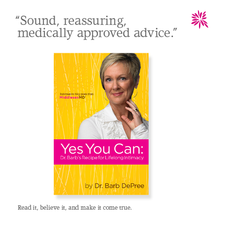I spent a lot of years providing prenatal care and delivering babies for hundreds of women, and I loved doing that. But, about a decade ago, I saw a void in one area of women’s health—menopause care. I heard from frustrated patients, and I didn’t see resources in my community. It was time to make a change to fill that gap.
I’d like to say there are no longer gaps in menopause care, but it isn’t true. Things are improving, but far too many women still aren’t getting the help they need. An article in the August/September 2018 issue of AARP The Magazine (yes, I read it) sums up the crisis: “3 out of 4 women who seek help for symptoms don’t receive it.” That’s too many women who are suffering for no reason. A Yale University study revealed that “while 60 percent of women with significant menopausal symptoms seek medical attention, nearly three-quarters of them are left untreated.” According to gynecologist Dr. Wen Shen, an assistant professor in the Johns Hopkins School of Medicine Department of Gynecology and Obstetrics, “nearly one-third of this country’s women are postmenopausal, and many of them are needlessly suffering.”
Too many medical schools don’t offer menopause training or courses for their students. In fact, according to the article, “A recent survey reveals that just 20 percent of ob-gyn residency programs provide any kind of menopause training. Mostly, the courses are elective. And nearly 80 percent of medical residents admit that they feel ‘barely comfortable’ discussing or treating menopause.”
The lack of properly trained menopause experts is concerning when you look at what else may be missed. Many physicians hear the word menopause and think “hot flashes, night sweats, weight gain, crazy hormones, sleep issues, etc.” and not beyond the stereotypical symptoms. The AARP article talks about the other issues that can result from hormonal changes: a rise in LDL cholesterol, increasing the possibility of a heart attack; a decrease in bone mass; an increased risk of diabetes; and concentration problems. These are substantive issues that can be easily missed if doctors don’t look at the big picture.
According to the article, “When their menopause is properly managed, particularly from the beginning, women may lower their risk for many of the common, life-threatening diseases that can mark their next quarter-century and beyond. For example, a 2017 study found that the more severe and longer lasting a woman’s hot flashes and night sweats are, the greater her risk for developing type 2 diabetes. Other studies have shown that treatment at the onset of menopause can slow the progression of osteoporosis.”
 As I said, things are improving, but it will take some time. Women like Chicago gynecologist Lauren Streicher are helping to lead the way for change in menopause care. She recently lobbied at Northwestern Memorial Hospital for a new Center for Sexual Medicine and Menopause. It took some convincing, but her research and facts led to the facility opening in October 2017. Lauren’s next move is to make menopause education a requirement in the ob-gyn residency program at Northwestern. Currently, it’s only an elective, but she’s working to make a menopause management course available to residents of every subspecialty.
As I said, things are improving, but it will take some time. Women like Chicago gynecologist Lauren Streicher are helping to lead the way for change in menopause care. She recently lobbied at Northwestern Memorial Hospital for a new Center for Sexual Medicine and Menopause. It took some convincing, but her research and facts led to the facility opening in October 2017. Lauren’s next move is to make menopause education a requirement in the ob-gyn residency program at Northwestern. Currently, it’s only an elective, but she’s working to make a menopause management course available to residents of every subspecialty.
I highlight all of this not to scare you, but to encourage you to be active in seeking out the best care for you. Prepare for your healthcare appointments; ask your questions about the effects of menopause; ask for a referral if your provider doesn’t have answers.
No physician can be expert in every area. When I made the switch to focus on menopause care, I pursued additional education and certification by the North American Menopause Society (NAMS) to be equipped to help women to feel better both physically and mentally through this time of transition in their lives (and was honored to be named NAMS Practitioner of the Year a few years ago). NAMS has certified more than 1,100 doctors in menopause management, and they offer continuing education and access to resources thereafter.
If you aren’t getting the care you need, it’s time to do some homework. One resource is “Find a Menopause Practitioner” on the NAMS website, which gives you a number of options for finding a certified resource near you. You deserve informed care appropriate to this stage of your life.
 Dr. Barb DePree, M.D., has been a gynecologist and women’s health provider for almost 30 years and a menopause care specialist for the past ten.
Dr. Barb DePree, M.D., has been a gynecologist and women’s health provider for almost 30 years and a menopause care specialist for the past ten.


0 comments